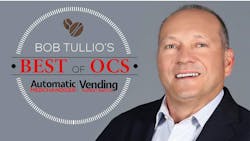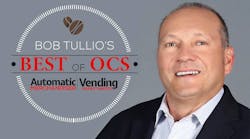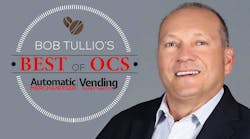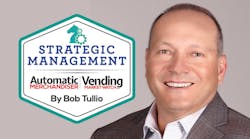Recession? Choose not to participate and pour on the sales effort
The last recession (June 2007 to December 2009) was very good to me. Not everyone can say that, but in the world of B2B sales, specifically convenience services, “recession” is another word for opportunity. Plus, based on the combination of the post-pandemic return to the workplace and the ongoing shortage of qualified help, this upcoming recession is going to be different, if it happens at all.
Capitalizing on the mentality
Recession or not, the mere mention of the word has CFOs thinking “cutbacks” and asking, “How can we save money?” That type of thinking is music to the ears of a savvy account executive because it creates a compelling reason for a decision-maker to meet with you. An operator should capitalize on this decision-maker mentality by asking one simple question: “If I can show you a way to cut your spending and improve your OCS and refreshment program at the same time, is there any reason why you would not be open to a short meeting to learn more?”
Choose not to participate
A great quote from the founder of Wal-Mart, Sam Walton, comes into mind in relation to increasing business development efforts during a recession. When asked in 1991, “What do you think about a recession?” he responded, “I thought about it and decided not to participate.” Listen to Sam. Instead of cutting back on your business development and sales efforts in the face of recession, spend more in a targeted fashion.
Lessons from history
During that last recession, there was plenty of pain, from business closures to job losses, largely driven by the crisis in the real estate, mortgage and banking sector. One thing we have learned from past recessions is that they are typically followed by robust times. A recession is the time to “set the table” for the big recovery that is just down the road. That is exactly what we did with our company, and when the economy began shooting off like a rocket in 2012, we were well-positioned.
A three-tier strategy that works
We focused on three business development strategies, which, by the way, will work nicely in any economic condition.
1. Increase pay-per-click (PPC) advertising. Yes, it is costly. The good news: If your competition isn’t reading this, chances are, they are cutting back on their advertising and especially PPC, so the price-per-click should come down.
I have written and spoken about PPC advertising before. As far as I am concerned, it is the “magic bullet.” Yes, you can rely on search engine optimization (SEO) and hope for the best, but if you want to put your sales reps in front of highly motivated prospects on a consistent basis, PPC is the answer.
Relying on SEO is like buying a patio set from Sears and putting it together yourself. Over time, it will get completed. It might even be assembled properly. It will be cheaper than buying one from the expensive patio furniture store where my neighbor bought his. The difference is this: My neighbor will be lounging on his patio, relishing in the success of his purchase, while I am still crawling along the floor a week later, looking for that missing nut and bolt. I speak from experience.
2. Increase paid strategic partnership efforts. Everyone is a little hungrier in leaner times, and it is easy to find a strategic partner who is motivated by compensation – my favorite type of strategic partner. Consider it part of the account acquisition cost. Would you pay $250 to $400 for an account that will generate $12,000 or much more in annual sales? Usually you find these strategic partners at trade shows or serving your existing accounts. I never hesitated to solicit them directly on LinkedIn. These strategic partners are calling on the same decision-makers that you are. They could be a commercial mover, an office supply rep, a plant service or a move planner.
These people know which companies are relocating, who is growing, who is unhappy and who makes the decisions. If they are a truly motivated strategic partner, the decision-maker will be expecting your call. My deal was simple: “Get me in the door – if I secure the account – you get paid.” A few strategic partners in this category can help you set the table for the post-recession bounce back.
3. Actively promote paid referral programs within your client base. If an existing client, an office manager or a facility manager refers you to another company, they get a $50 gift card after the appointment and a $200 gift card when you install the location.
Not everyone is motivated by this type of program, but the small percentage who are, can keep the prospect pipeline overflowing.
How to deliver on that one simple question
Remember the one simple question I referred to that becomes very easy to ask during a recession? “If I can show you a way to cut your spending and improve your OCS and refreshment program at the same time, is there any reason why you would not be open to a short meeting to learn more?”
It is not difficult to deliver a better program for less money, (without cutting prices), if you are willing to open your eyes and consider the possibilities. Here are five easy examples – with additional questions that the client must answer.
- Is the client willing to convert from single cup to an artisan roasted drip coffee program?
- Is the client willing to replace bottled water with a high-end point of use system?
- Is the client willing to switch from cases of bottled beverages to a single-serve beverage unit.
- Is the client willing to switch from packaged snacks to bulk snacks?
- Is the client willing to try a multiple coffee strategy to achieve a lower overall price?
It always comes down to the same thing. Are you willing to swim against the current? Are you willing to toss out your cookie-cutter programs and develop simple but creative solutions? If the answer is yes, you will more than survive the recession and be well-positioned for the strong recovery that is just around the corner.
ABOUT THE AUTHOR
Bob Tullio is a content specialist, speaker, sales trainer and business columnist who advises entrepreneurs on how to build a successful business from the ground up. He also specializes in helping suppliers connect with operators in the convenience services industry – coffee service, vending, micro markets and pantry service specifically.
Tullio delivers this promise to any company that hires him for a 30-minute or 1-hour Zoom call: "One short session with me will elevate the performance of your sales team.”
Tullio can be reached at [email protected] or 818 261-1758.
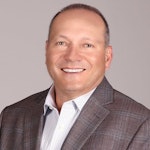
Bob Tullio
Bob Tullio is a content specialist, speaker, sales trainer, consultant and contributing editor of Automatic Merchandiser and VendingMarketWatch.com. He advises entrepreneurs on how to build a successful business from the ground up. He specializes in helping suppliers connect with operators in the convenience services industry — coffee service, vending, micro markets and pantry service specifically. He can be reached at 818-261-1758 and [email protected]. Tullio welcomes your feedback.
Subscribe to Automatic Merchandiser’s new podcast, Vending & OCS Nation, which Tullio hosts. Each episode is designed to make your business more profitable.
